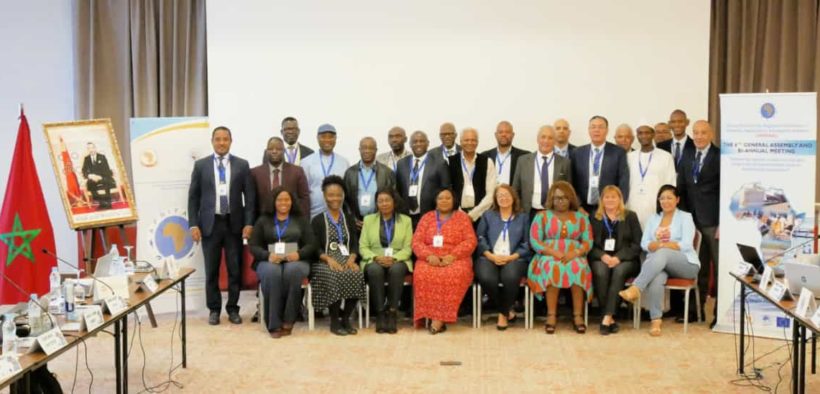Zimbabwe’s livestock sector is positioned to take a leading role in the national inclusive transformation agenda as the country targets to attain an upper middle income economy by 2030, a government official has said.
https://www.businessweekly.co.zw/livestock-sector-exhibits-potential-to-drive-economic-growth/
View Full Post and Comments
AFRICAN Union – InterAfrican Bureau for Animal Resources (AU-IBAR) director Huyam Salih says the Resilient African Feeds and Fodder Systems (RAFFS Project) is expected to transform the Zimbabwe African Women in Animal Resources Farming and Agribusiness Network (AWARFA-N).
https://www.newsday.co.zw/theindependent/local-news/article/200019852/raffs-project-gamechanger-for-women-au-ibar-director
Continue Reading
ZIMBABWE African Women in Animal Resources Farming and Agribusiness Network (AWARFA-N) president Jacqueline Gowe has pleaded with the government to give them a piece of land to conduct their operations.
https://www.thestandard.co.zw/business/article/200019853/awarfa-n-pleads-for-land-from-government
Continue Reading
THE African Union-InterAfrican Bureau for Animal Resources (AU-IBAR) and the Bill and Melinda Gates Foundation, will tomorrow launch the resilient African feed and fodder systems project in Zimbabwe.
https://www.businessweekly.co.zw/raffs-project-to-be-launched-in-zimbabwe/
View Full Post and Comments
FEED and fodder business development expert David Maina says the resilient African feed and fodder systems project (RAFFS Project) will increase the competitiveness and sustainability of the industry on the continent.https://www.thestandard.co.zw/index.php/business/article/200019813/raffs-project-helps-sustain-feed-and-fodder-sector-expert
Continue Reading
THE government has committed its full support to the resilient African feed and fodder systems project (RAFFS Project), citing its importance in mitigating the negative effects of climate change, COVID-19, and the conflict between Russia and Ukraine.
https://www.newsday.co.zw/business/article/200019809/govt-pledges-full-support-for-the-feed-fodder-project
Continue Reading
L’atelier régional sur les accords d’accès aux ressources halieutiques des États africains de l’océan Atlantique a débuté le 25 octobre 2023 à Abidjan, en Côte d’Ivoire. Cet événement, organisé par la Conférence ministérielle sur la coopération halieutique entre les États africains riverains de l’océan Atlantique (COMHAFAT), rassemble les responsables d’institutions et organisations régionales de pêche et d’aquaculture en Afrique, ainsi que les représentants des ministères des pêches des pays africains riverains de l’atlantique. Lire la suite sur le site internet de l’Observatoire des Médias pour une Pêche Durable en Afrique
https://www.mosfa-ompda.org/2023/10/atelier-regional-sur-les-accords-dacces-aux-ressources-halieutiques-dans-les-pays-cotiers-riverains-de-locean-atlantique/
Continue Reading
xxxxxvvvbb ccvbb
ccvbb
Continue Reading
 Début ce jour à Tanger, Maroc de la sixième assemblée générale de la Plateforme Africaine pour les Institutions Régionales dans les domaines de la Pêche, de l’Aquaculture et des systèmes Aquatiques (APRIFAAS), Lire l’article via site internet MOSFA https://www.mosfa-ompda.org/2023/10/ouverture-de-la-sixieme-assemblee-generale-de-laprifaas-a-tanger-maroc-renforcer-la-cooperation-regionale-pour-une-meilleure-integration-environnementale-dans-les-secteurs-de-la-peche-et-de-laq/
Début ce jour à Tanger, Maroc de la sixième assemblée générale de la Plateforme Africaine pour les Institutions Régionales dans les domaines de la Pêche, de l’Aquaculture et des systèmes Aquatiques (APRIFAAS), Lire l’article via site internet MOSFA https://www.mosfa-ompda.org/2023/10/ouverture-de-la-sixieme-assemblee-generale-de-laprifaas-a-tanger-maroc-renforcer-la-cooperation-regionale-pour-une-meilleure-integration-environnementale-dans-les-secteurs-de-la-peche-et-de-laq/
Continue Reading
Against all odds, women are defying convention and spearheading a groundbreaking revolution in the feed and fodder sector- which has for long been male dominated.
With tenacity and innovation, a group of women from across Africa are breathing new life into the feed and fodder sector as well as livestock production and reshaping the course of their communities’ and countries’ economic future.
The sector is currently facing a major crisis due to the ongoing Russia-Ukraine war, global COVID-19 pandemic and climate change.
In the shadows of these challenges and adversities, some women are emerging as catalysts of change in the crucial feed and fodder sector.
Some of the women playing a crucial role in the sector are at the ongoing African Union-InterAfrican Bureau for Animal Resources (AU-IBAR) workshop in Kenya- where a high-level discussion on how to cushion member states and empower women is ongoing.
https://www.capitalfm.co.ke/news/2023/07/pioneering-african-women-in-feed-and-fodder-sector-ignites-a-trailblazing-path-for-others/
Continue Reading

 ccvbb
ccvbb